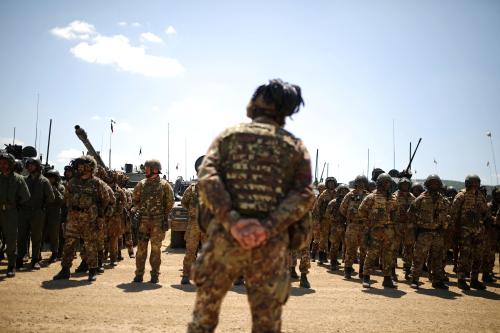This Tuesday, George W. Bush is expected to unveil his plans for the future of nuclear weapons and the role of missile defenses. A key question will be how he proposes to handle an issue that deeply divides Washington and its European allies: whether to seek Russia’s agreement to modify the 1972 Anti-Ballistic Missile Treaty or instead simply abandon it.
For months administration officials have derided the ABM Treaty as a “relic of the Cold War.” They argue that with the Soviet Union gone, the treaty’s ban on nationwide defenses no longer makes sense. And by prohibiting the development of new technologies, the treaty prevents America from countering new missile threats from unpredictable regimes. The administration has good reason to try to modify or even replace the ABM Treaty. A limited national missile defense targeted against rogue states makes sense if it can be made to work. But a unilateral withdrawal, announced before Washington has demonstrated that it can build effective defenses and without any attempt to engage Moscow in serious negotiations, would severely damage American interests abroad. It would also jeopardize efforts to maintain domestic political support for missile defense.
A unilateral withdrawal would be a foreign policy disaster. Russia would respond by abandoning its commitment under the START-2 Treaty to slash its nuclear forces and by suspending bilateral programs designed to secure and destroy its aging arsenal.
Russia’s more than 5,000 strategic nuclear warheads still pose the single largest threat to Western security, and the possibility that terrorists might steal a Russian nuclear weapon remains a grave concern.
America’s friends and allies would react with horror at a treaty withdrawal.
Coming on the heels of the Senate’s rejection of the Comprehensive Test Ban Treaty, the administration’s refusal to submit the treaty on the International Criminal Court for Senate consent and Mr. Bush’s abandonment of the Kyoto Protocol, unilateral withdrawal from the ABM Treaty would be widely seen as definitive proof that the United States has become a rogue superpower that considers itself above the law.
Alienating the allies in this fashion would complicate any efforts to build a missile defense. Britain and Denmark might refuse to allow the Pentagon to upgrade radars based on their territory that are critical to an anti-missile shield.
The damage could be far broader. Allies might become much less likely to defer to Washington on issues of major concern because they believe that it no longer intends to return the favor.
Unilateral withdrawal would trigger a divisive political debate at home. Members of Congress galvanized into opposing the administration’s missile defense plans by a unilateral withdrawal would have the public behind them.
Polls show that support for missile defense is closely tied to the costs involved. When Americans are asked if they support missile defense in the abstract, only one in three says “no.” But when asked if they support it if it jeopardizes arms reductions with Russia, only one in three says “yes.”
Why might the Bush administration be ready to run these risks? In a word, ideology. Nearly all its senior officials have dedicated their careers to attacking the ABM Treaty. This time, unlike during the Reagan and first Bush administrations, they might not let the chance go by to bury it once and for all.
Compounding the problem is a diplomatic miscalculation. Key allies dropped their harsh public criticism of missile defense after Mr. Bush’s election thinking that a less confrontational approach would enable them to temper a policy that they consider unnecessary and unwise. The administration appears to have taken their public silence as allied consent.
It is not too late for President Bush to reverse course. Rather than abandon the ABM Treaty, he should make clear that the United States will live within its strictures provided that Moscow commits to a serious effort to negotiate the necessary modifications, or even a mutually acceptable replacement, that enable limited defense deployments to go forward.



Commentary
Op-edUnilateral Withdrawal From the ABM Treaty Is a Bad Idea
April 30, 2001